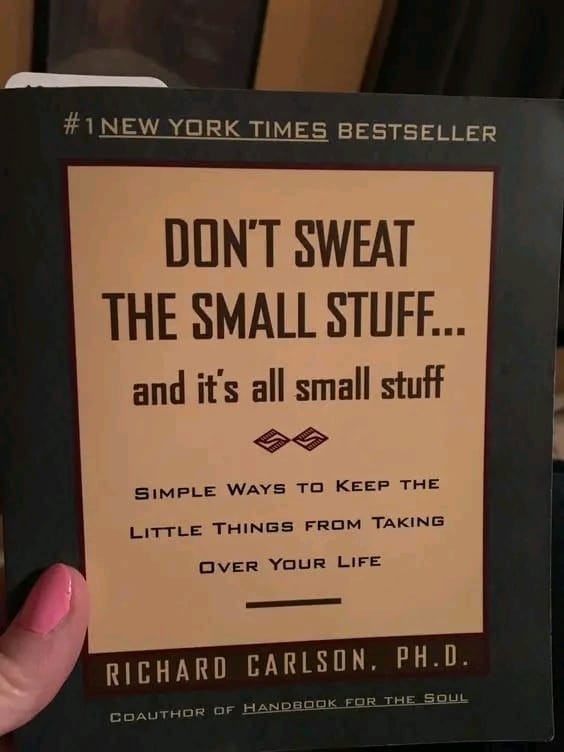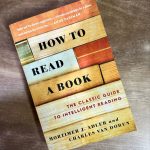When we step back and ask ourselves: “Is this worth wasting my energy on?” We’d mostly find that the answer is a resounding No. Identifying the “small stuff” that consumes our energy and letting it go is the crux of the book. I am sharing with you 14 bite-sized pieces of wisdom I gleaned from this “toolbelt” for navigating life’s challenges with greater ease.
- Ignore the Small Stuff
There are many “small stuff” that happen every day in our lives. Whether we have to wait in line, listen to unfair criticism, do the lion’s share of work, or watch a stranger cut in front of us in traffic, it pays enormous dividends if we learn not to worry about these little things. Richard argues that many people spend so much of their life energy “sweating the small stuff’ that they completely lose touch with the magic and beauty of life. Stepping back from the immediate drama reminds you that most small stuff fades in the grand scheme of things and leaves you with more energy to be kinder and gentler. - Make Peace with Imperfection
Richard proposes that the need for perfection and the desire for inner peace conflict with each other, and it is a losing battle to want a life filled with peace when you are an absolute perfectionist. You are dissatisfied and discontent, always on the lookout for what’s wrong and what needs fixing – a disorganized closet, a scratch on the car, an imperfect accomplishment, a few pounds you would like to lose, or someone’s imperfections. But the very act of focusing on imperfection pulls us away from our goal of being kind and gentle. Sometimes, it is just okay to let things stay as they are, to cut yourself some slack and accept your imperfections. - Show Compassion:
To not sweat the small stuff, we must practice compassion. Compassion involves the willingness to put one’s self in someone else’s shoes, to imagine what it’s like to be in someone else’s predicament, and simultaneously feel love for that person. Richard reveals that compassion involves two primary things: intention and action. While intention opens you up to others and their needs, action is “what you do about it.” The heart we put into the act is often more important than the “size” of the act. And as Mother Teresa reminds us, “We cannot do great things on this earth. We can only do small things with great love.” - Everything else can wait:
The author said something I consider profound, and it is that, nothing is more important than our sense of happiness and inner peace and that of our loved ones. If we cut our obsession with getting everything done, we will see that in reality, almost everything can wait. Very little in our work lives truly falls into the “emergency” category. Work will all get done in due time. What we have zero control over is our time here on earth, and so, the least we can do is spend it doing the things we love with the people we love, relishing every minute of it. - Gentle, relaxed people can be superachievers too
I always thought that the people who are always on the go, always hustling, always working on the next big thing are the superachievers. But Richard argues that when you have that inner peace, you are less distracted by the next shiny thing and therefore, it is easier to focus on your goals, stop expending unnecessary energy, and give back to others. - When you do good, don’t sound your trumpet and ignore reciprocity
While all acts of kindness are inherently wonderful, Richard points out that there is something even more magical about doing something thoughtful and never mentioning it to anyone, ever. By keeping it to yourself, you are sure you’re not secretly seeking anyone’s approval, and you get to revel in the abundant joy that comes with being kind and generous. Richard goes on the emphasize that generosity is its own reward, so when you do good to someone don’t ask for, or expect one in return. - Live in the present
We allow past problems and future concerns to dominate the moment we are in, so much so that we end up anxious, frustrated, depressed, and hopeless. On the flip side, we also postpone our gratification, our stated priorities, and our happiness, often convincing ourselves that “someday” will be better than today. Unfortunately, this “someday” never actually arrives. What we have is the present moment and Richard implores us to make the most of it, as if we have no past nor future. - Choose to be happy and kind over being right
“One of the most important questions you can ever ask yourself is, ‘Do I want to be ‘right’—or do I want to be happy?’ Many times, the two are mutually exclusive!” According to Richard, it’s often just our egos and our obsession with being right that creep in and ruin an otherwise peaceful encounter that will allow the other person to bask in the joy of being right. However, there are certain positions when one should not budge such as when you hear a racist comment. Here, it’s important to speak your mind with love and caution. Also, we are advised to always remember we have chances to “correct” people, privately as well as in front of others. - Be the First One to Act Loving or Reach Out
Richard tells the story of an ailing woman who had not spoken to her son in over three years because of a small disagreement, to argue the need for us to not hold on to little resentments that may have stemmed from an argument, a misunderstanding, the way we were raised, or some other painful event. When she finally did reach out, her son took the initiative to apologize, and as is usually the case when someone takes the chance to reach out, everyone wins. Whenever we hold on to our anger, we turn “small stuff” into really “big stuff” and make our positions more important than our happiness. - Accept that life isn’t fair
One of the mistakes many of us make is to feel sorry for ourselves, or for others, thinking that life should be fair, or that someday it will be. It’s not and it won’t. Richard reminds us that “Life isn’t fair. It’s a bummer, but it’s absolutely true. Ironically, recognizing this sobering fact can be a very liberating insight.” - Once a Week, Write a Heartfelt Letter
Carlson advises that taking a few minutes each week to write a heartfelt letter does many things for you. Picking up a pen or typing on a keyboard slows you down long enough to remember the beautiful people in your life. Just the act of sitting down to write helps to fill our life with gratitude, focuses our attention on what’s right in our life, and more importantly, the person receiving it will, in all likelihood, be extremely touched and grateful. - Set aside quiet time, every day
This book suggests we find a nice spot where we can spend a minute or two looking at the view or closing our eyes and breathing. This simple act slows us down and helps us feel centred and grateful. You can also spend a part of this time, thinking of someone to thank, or just thinking about someone you love. - How to hug the porcupines
Carlson offers insightful advice on how to deal with challenging people with grace and compassion. He advises us to think of someone who truly irritates us, who makes us feel angry as tiny infants or as hundred-year-old adults. Imagine they don’t have the bandwidth to deal with some situations. See their innocence, and grant them compassion. - Understand separate realities
Here, Richard encourages us to consider deeply the fact that we are all very different and respect that. When we do, the love and compassion we feel for others will greatly increase just as fast as the appreciation we have for our own uniqueness increases.
There are over 80 other unique lessons from the book that are not captured in this post, I recommend you read it if you are looking to stop stressing yourself and find some peace amidst the everyday chaos.
BUY BOOK HERE
FREE AUDIOBOOK

